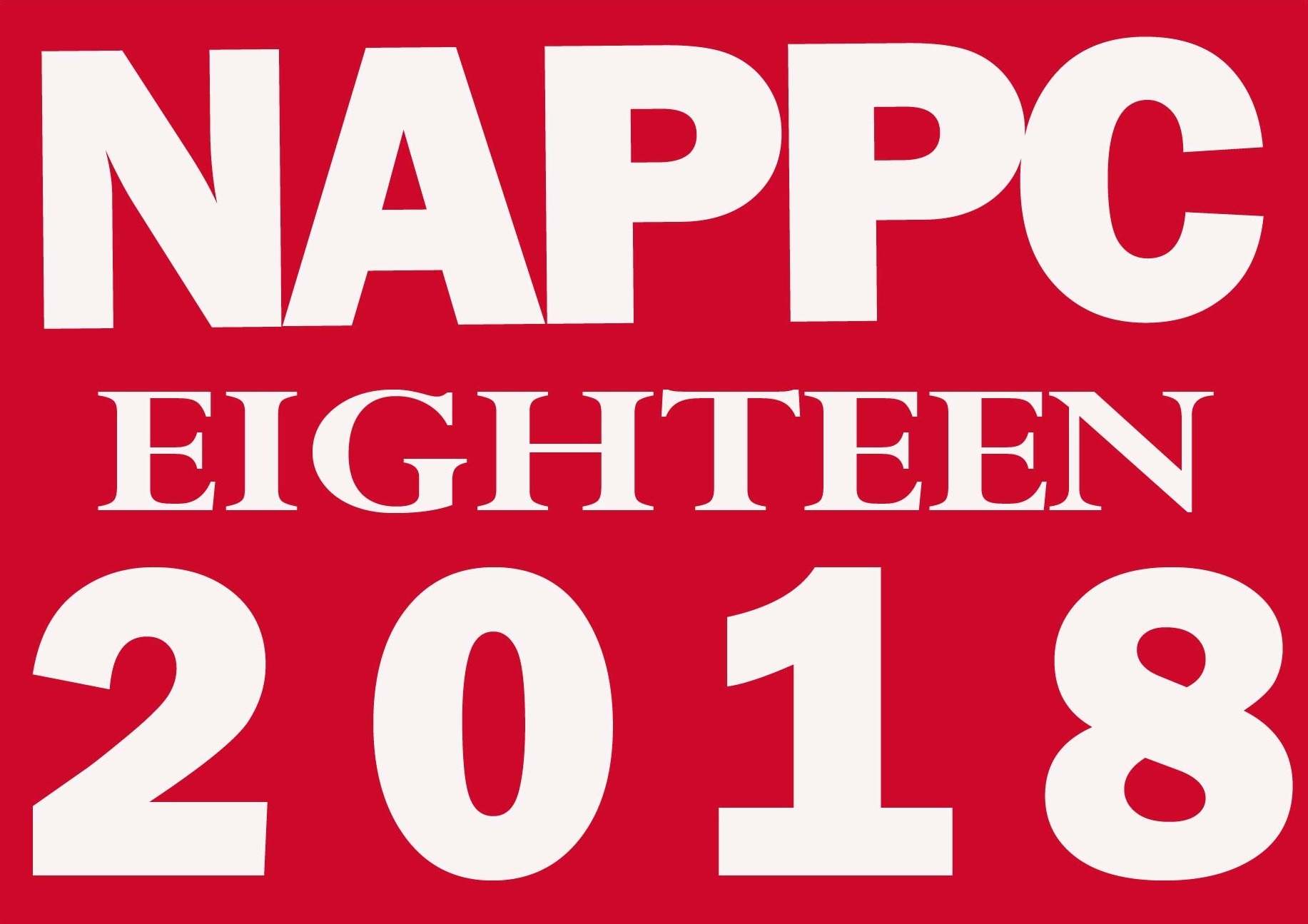NAPPC 2018 Conference Recap
This year's North American Pollinator Protection Campaign (NAPPC) Conference, hosted at the U.S. Department of Agriculture, was a huge success with many first-time participants from a diverse collection of fields. The Pollinator Partnership and NAPPC Team works tirelessly to bring partners of all backgrounds together, working to find common ground on innovative initiatives that benefit pollinators.
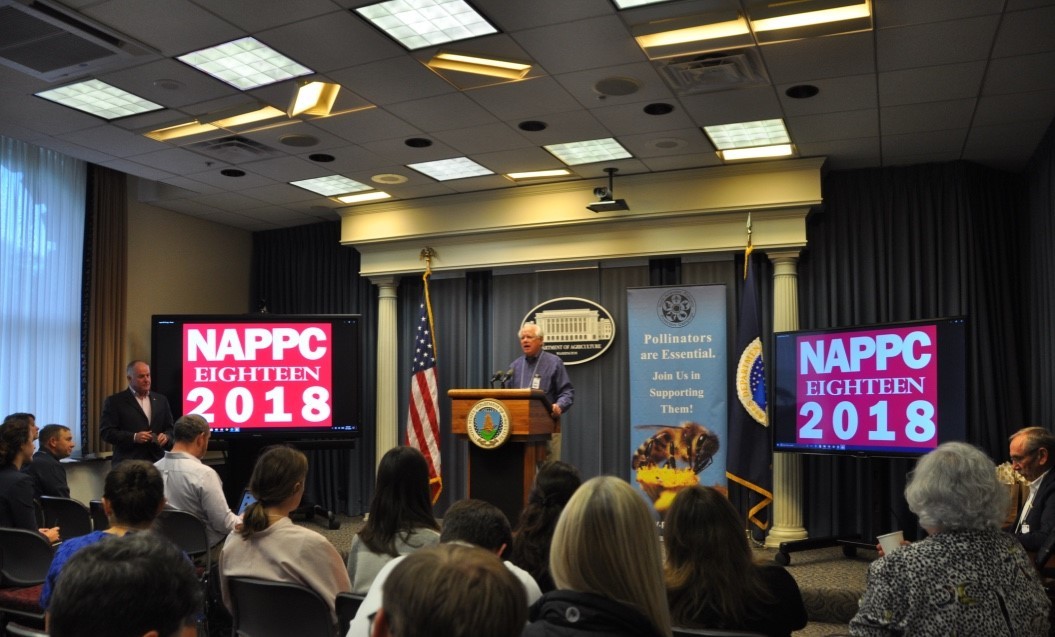
This event included wonderful, world class presentations from leaders at the forefront of pollinator issues. Topics ranged from an update on beekeeping to habitat restoration, the effects of climate change on wildlife habitat, and corporate partnerships. Speakers included:
*Click on hyperlinked names below to view the presentations.
- Dr. David Inouye, University of Maryland
- Dr. Nigel Raine, University of Guelph
- Dr. Christian Krupke, Purdue University
- Dr. Chip Taylor, Monarch Watch
- Dr. Steve Hendrix, University of Iowa
- Kim Flottum, Bee Culture Magazine
- Dr. Anna Hess and Robert Hess, Minnesota DNR and Wisconsin DNR
- Mary Phillips, National Wildlife Federation
Additionally, NAPPC convened 8 task forces who aim to establish year-long objectives surrounding a certain pollinator issue. Some task forces are focused on the conservation of specific pollinators, engaging broad stakeholders to promote the monarch butterfly and exploring the role of NAPPC in making positive contributions to bumble bees. Another is developing and disseminating pesticide applicator training and addressing other pressing pesticide issues. The Bee Friendly Farming task force is building on an existing project that establishes pollinator-friendly criteria for farmers. The honey bee health task force creates an RFP with relevant priority areas for scientific grants. Current grantees gave updates on their honey bee health research on the following topics:
Dr. May R. Berenbaum, University of Illinois at Urbana-Champaign
Sublethal effects of tank-mix pesticides in combination with honey phytochemicals on queen cell nursing behavior and queen quality
Alexander Burnham and Samantha Alger, University of Vermont
Shared honey bee and bumble bee viruses: demonstrating the floral transmission route
Dr. Erin Calfee, UC Davis
Identifying key loci for honey bee stock improvement using genomic signatures of selection in Africanized bees
Steven Reyna, North Carolina State University
Development of an RNAi-based strategy for small hive beetle control
Madison Turner, University of Guelph
Natural Products to Control American Foulbrood in Honeybees
2018 Pollinator Award Winners
NAPPC also presented 7 awards to pollinator advocates, farmer ranchers, and other land managers who have worked for years to promote pollinators. These awardees understand just how important pollinators are to food, culture, and life. They have taken that extra step to help out the birds, bees, butterflies, moths, and bats that support agriculture and ecosystems everywhere. NAPPC, through its recognition and appreciation of these individuals, encourages their activities and hopes to catalyze future actions on behalf of pollinators.
Dr. Andony Melathopoulos - Oregon State University
NAPPC POLLINATOR ADVOCATE USA 2018
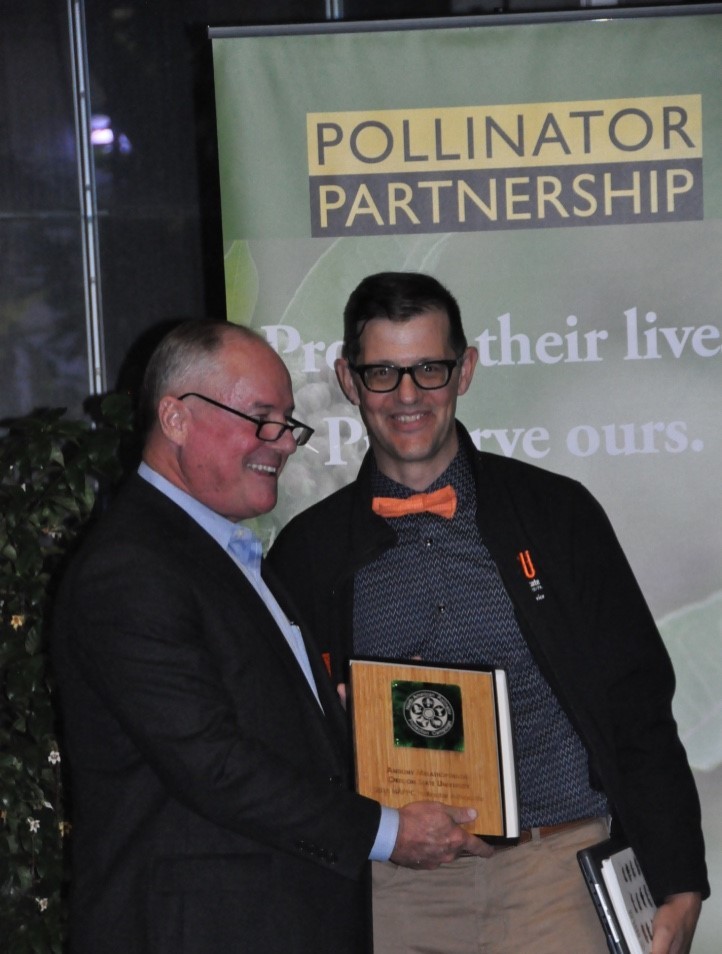
Dr. Andony Melathopoulos of Oregon State University is an entomologist with a passion for promoting bee health and educating growers, forest landowners, landscapers, the general public, and pesticide users. He has worked with various stakeholders to make tremendous strides in helping develop a strategic plan to promote the health of both wild and managed bees in the State of Oregon. In early 2017, he was instrumental in the creation of the Oregon Bee Project, a multi-agency initiative aimed at protecting bees from pesticide exposure, increasing habitat, reducing impacts of diseases and pests on bees, and expanding understanding of the bees of Oregon. As part of this initiative, Dr. Melathopoulos has trained 163 individuals and formed 10 regional volunteer groups to collect and pin bees for the Oregon Bee Atlas. For Pollinator Week 2018, he coordinated 20 events across the state. He has also produced 50 episodes of PolliNation Podcast, which feature special guests and highlight issues bees face. Since September 2016, Dr. Melathopoulos has personally presented to more than 2,500 pesticide applicators on practices to minimize pesticide exposure risk to bees.
The Farmlands Trust Society
NAPPC POLLINATOR ADVOCATE CANADA 2018
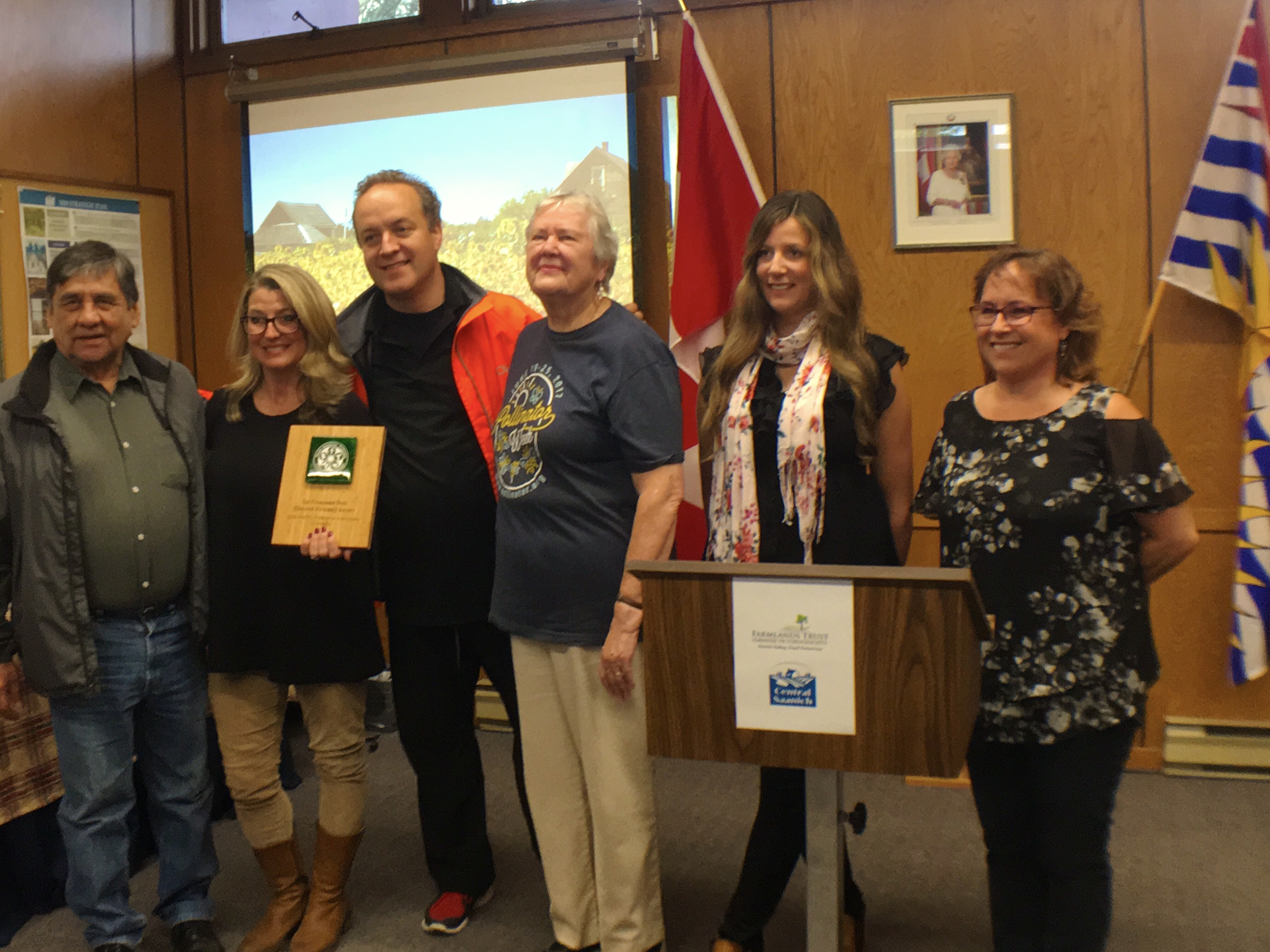
The Farmlands Trust Society (FLT) is a charitable not-for-profit organization located in Saanichton, British Columbia. The FLT works to enhance farming capacity in the Greater Victoria area by protecting local farmland, protecting eco-sensitive and culturally special areas, producing food for those in need, providing relevant educational opportunities, promoting the economic viability of farmland, and providing community access and public awareness programs. Since 2012, the society has been gradually returning the 100-year-old historic Newman Farm in Saanichton to active agricultural uses. FLT leads the “field to plate” initiative at Newman Farm where FLT volunteers grow, harvest, and donate local fruits and vegetables to those in need at Our Place Society in Victoria to aid in relieving poverty and mitigating food insecurity for marginalized populations in society. They are also important, active members of the Island Pollinator Initiative.
César Damian and Elena Barba - FRONDA
NAPPC POLLINATOR ADVOCATE MEXICO 2018
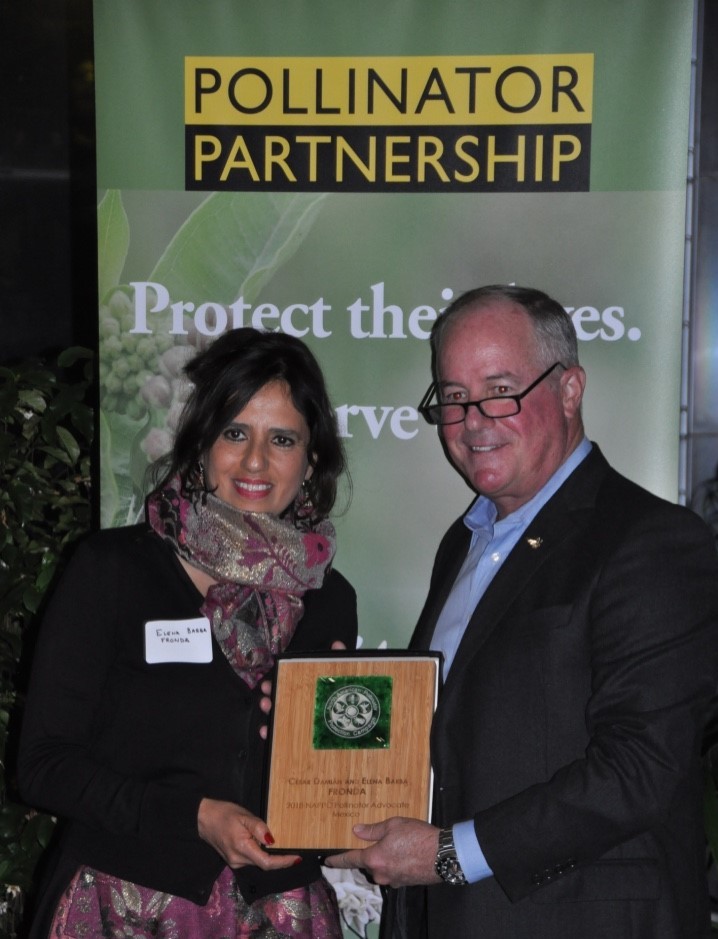
César Damian and Elena Barba are co-founders and directors of FRONDA, a non-profit organization whose objective is to promote artistic disciplines in rural and urban spaces outside of Mexico City, through the creation of projects aimed at the creation, exploration, training, exchange and dissemination of interdisciplinary and intercultural art. In February, FRONDA developed the culture event “Symbiosis, Encounters between Bees, Artists and Scientists” in Mexico. FRONDA is adapting Border Free Bees’ methods of community-based art practice and collaborations to the Mexican context where students are often afraid to speak out about environmental issues. FRONDA intends to weave ties between artists, educators, scientists, physical places, and memory, through activities of interaction with the community, giving pollinator projects an emphasis that favors the Mexican identity and local values.
John and Nancy Hayden - The Farm Between
NAPPC FARMER-RANCHER USA 2018
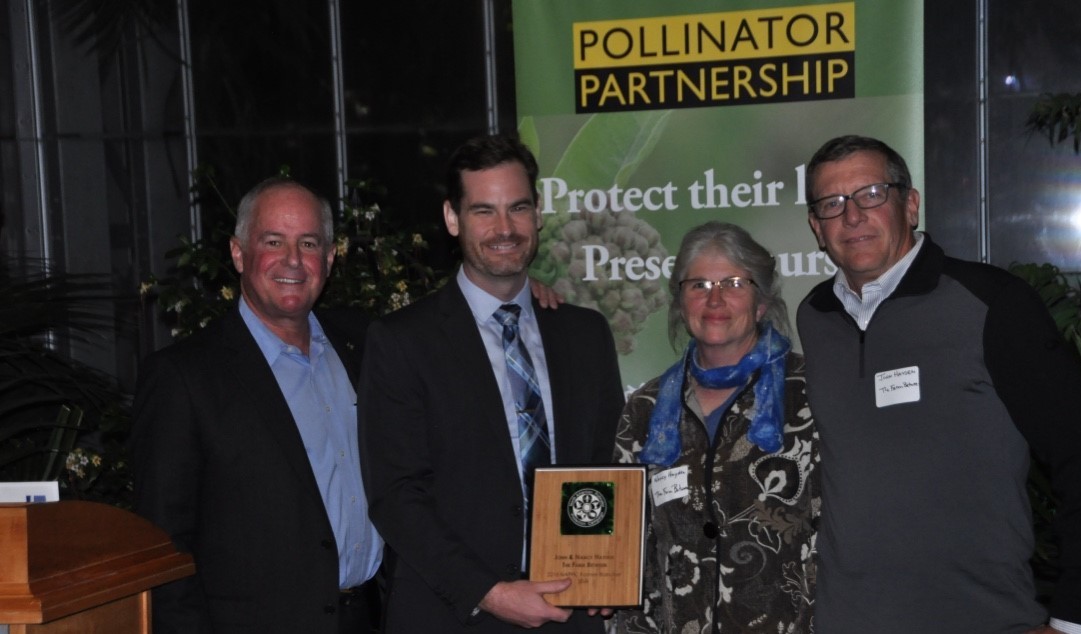
John and Nancy Hayden have been proprietors of The Farm Between in Jeffersonville, Vermont for 26 years. The Farm Between is a 20-acre certified organic nursery and fruit farm specializing in production and sale of pollinator-dependent fruit and berry crops, shrubs, and trees, and more than half of the farm’s area is devoted to pollinator habitat enhancement. John, a trained entomologist, has made a number of significant contributions in the area of pollinator conservation and management, including the establishment of a 14-acre pollinator sanctuary at a former dairy farm, where he conducts long-term bee species diversity monitoring and demonstrates effective pollinator land management practices. In 2007, John and Nancy founded Seeds of Self-Reliance, a nonprofit organization with international scope working to promote biological diversity of pollinators and other organisms in the context of sustainable agriculture. A related program, Pollinator Pathways, provides outreach and education in Vermont on the importance of pollinators to our food systems. In 2016, John was appointed by Vermont’s governor to serve on the state’s Pollinator Protection Committee, and he is frequently asked to testify before legislative committees on pending legislation related to pesticide use, pollinator conservation, and sustainable agriculture.
Cody Straza and Allison Squires - Upland Organics
NAPPC FARMER-RANCHER CANADA 2018
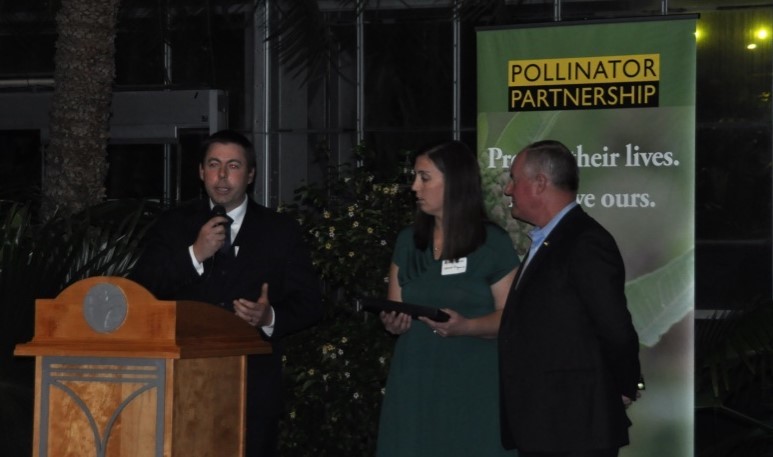
Cody Straza and Allison Squires are co-owners and operators of Upland Organics, a 2000 acre certified organic grain farm near Wood Mountain, Saskatchewan. Their vision is to create a family orientated, environmentally and economically sustainable organic farming operation, which contributes in a positive and significant way to both the local community and the greater organic agricultural community. To this end, they are working towards converting their entire farm to no-till. Cody serves as the Vice President of SaskOrganics, allowing him to promote the organic industry across the prairie provinces. He also joined the Organic Value Chain Round Table, bringing the prairie farmer’s perspective and input to national level discussions. Allison promotes involving organic producers at the individual farm level and believes that it will contribute to the overall applicability of research in this sector. She has helped implement several on-farm research projects at Upland Organics, and serves as director on the Canadian Organic Growers board. Upland Organics is a certified Bee Friendly Farm through Pollinator Partnership. They are one of the few large-acre farms in Canada to hold this certification.
Francis Ford Coppola Winery
NAPPC BUSINESS FOR BEES 2018
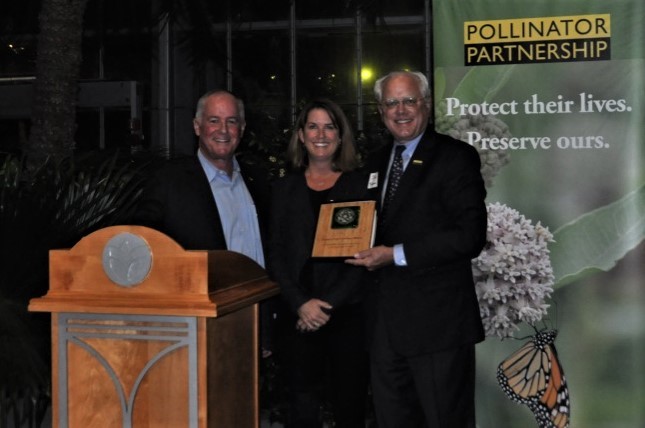
Francis Ford Coppola Winery (FFCW) farms 75 acres of Bee Friendly Certified vineyards at its Geyserville, California winery. FFCW and the surrounding estate are also certified by the California Sustainable Winegrowers Alliance, a program that provides third-party verification of a winery’s commitment to sustainability and covers all aspects of operations including vineyards, wine production, worker safety, environmental impacts and continuous improvement. In addition to the vineyards, FFCW has extensive gardens that provide 6,000 lbs. of produce annually for the restaurants and flowers for decoration. Through the integrated pest management program, they promote the biodiversity of the vineyard with beneficial insects, soil fauna, bluebird boxes, and owls that combat pests of grapevines. Soil erosion is prevented using three-season cover crops that also replenish essential nutrients back into the soil. As a wider initiative, FFCW is part of Sonoma County Winegrower’s three-phase commitment to become the nation’s first 100% sustainable wine region by 2019.
Illinois Department of Transportation
NAPPC ROADSIDE MANAGERS 2018
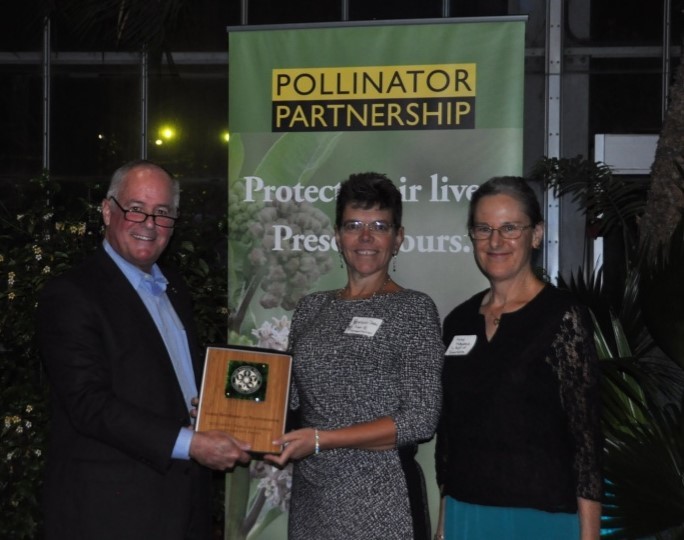
The Illinois Department of Transportation (IDOT) has demonstrated their long-term commitment to pollinator habitat in multiple ways, including new mowing policies that will create an estimated 100,000 additional acres of pollinator habitat and the dedication of $500,000 of their annual budget for new pollinator habitat and restoration projects. They have also updated the statewide seeding specifications and standards to include monarch butterfly and pollinator friendly seed mixes, with multiple species of milkweed. Additionally, they place a large emphasis on pollinator friendly rights-of-way (ROW) management, partnering with companies to provide habitat along ROWs, engaging in multiple ROW working groups, serving on the ROW Sector Technical Team in 2017 and 2018, and drafting the Transportation ROW strategies for the sector. IDOT regularly engages the public with by staffing fair booths, registering existing habitat, and distributing over 7,000 seed packets. They are working towards restoring 200 acres of pollinator habitat since August 2016.

